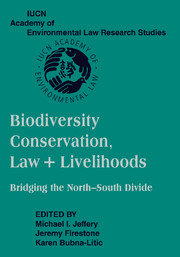 Biodiversity Conservation, Law and Livelihoods: Bridging the North-South Divide
Biodiversity Conservation, Law and Livelihoods: Bridging the North-South Divide Book contents
- Frontmatter
- Contents
- Acknowledgments
- Message from Kofi A. Annan, Secretary-General of the United Nations
- Macquarie Statement
- Contributors
- Introduction
- PART ONE THE CONTEXT
- PART TWO BIODIVERSITY: ITS CONSERVATION
- 5 Biodiversity Conservation in the Context of Sustainable Human Development: A Call to Action
- 6 Legal and Paralegal Rules for Biodiversity Conservation: A Sequence of Conceptual, Linguistic, and Legal Problems
- 7 Future Directions in Conservation of Biological Diversity: An Interdisciplinary Approach
- 8 Experience, Mistakes, and Challenges: The Implementation of the Convention on Biological Diversity in Brazil
- 9 EC Law and Biodiversity
- 10 Community-Based Biodiversity Conservation in the Pacific: Cautionary Lessons in “Regionalising” Environmental Governance
- PART THREE CONSERVATION MEASURES
- PART FOUR USES OF COMPONENTS OF BIODIVERSITY
- PART FIVE PROCESSES AFFECTING BIODIVERSITY
- PART SIX BIOSECURITY ISSUES
- PART SEVEN ACCESS AND BENEFIT-SHARING
- Index
8 - Experience, Mistakes, and Challenges: The Implementation of the Convention on Biological Diversity in Brazil
Published online by Cambridge University Press: 31 July 2009
- Frontmatter
- Contents
- Acknowledgments
- Message from Kofi A. Annan, Secretary-General of the United Nations
- Macquarie Statement
- Contributors
- Introduction
- PART ONE THE CONTEXT
- PART TWO BIODIVERSITY: ITS CONSERVATION
- 5 Biodiversity Conservation in the Context of Sustainable Human Development: A Call to Action
- 6 Legal and Paralegal Rules for Biodiversity Conservation: A Sequence of Conceptual, Linguistic, and Legal Problems
- 7 Future Directions in Conservation of Biological Diversity: An Interdisciplinary Approach
- 8 Experience, Mistakes, and Challenges: The Implementation of the Convention on Biological Diversity in Brazil
- 9 EC Law and Biodiversity
- 10 Community-Based Biodiversity Conservation in the Pacific: Cautionary Lessons in “Regionalising” Environmental Governance
- PART THREE CONSERVATION MEASURES
- PART FOUR USES OF COMPONENTS OF BIODIVERSITY
- PART FIVE PROCESSES AFFECTING BIODIVERSITY
- PART SIX BIOSECURITY ISSUES
- PART SEVEN ACCESS AND BENEFIT-SHARING
- Index
Summary
A BRIEF SUMMARY ABOUT THE MAIN ENVIRONMENTAL FACTS THAT HAVE INFLUENCED THE NEGOTIATIONS AND ADOPTION PROCESSES OF THE CONVENTION ON BIOLOGICAL DIVERSITY (CBD)
The necessity to conserve biological diversity and to use its elements in a sustainable way has recently been put onto diplomatic agendas. The relationship between conservation and sustainability was first emphasized at the United Nations Conference of the Human Environment (Stockholm) in 1972. This conference assembled emergent and developed countries and gave environmental issues international relevance. Although many regional and international agreements were signed at the conference and the United Nations Environmental Programme (UNEP) was established as an expression of the environmental consciousness of the United Nations (UN), the experience of the following years have demonstrated that many other challenges need to be faced.
The integration between environment and development has emerged as an extremely important problem in the 1980s. Considering the interdependence between these two elements, in 1982, the General Assembly of the United Nations adopted the World Charter for Nature, which emphasizes the intrinsic value of specimens and ecosystems. In 1983, the World Commission on Environment and Development was established to study the topic worldwide and write a formal report with its conclusions. In this report – Our Common Future – the commission has stated that economic development should become environmentally less destructive and, considering this, the sustainable development concept was introduced. Despite some progress, the increasing loss of biological diversity has continued to be a problem globally.
- Type
- Chapter
- Information
- Biodiversity Conservation, Law and Livelihoods: Bridging the North-South DivideIUCN Academy of Environmental Law Research Studies, pp. 155 - 180Publisher: Cambridge University PressPrint publication year: 2008


